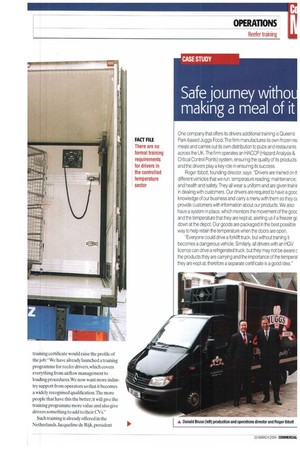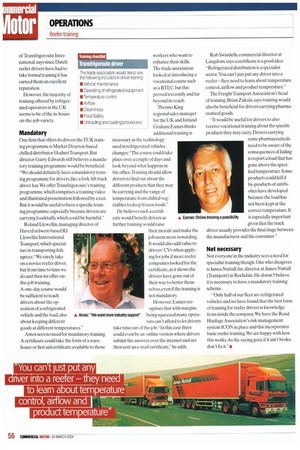COLD COMFORT
Page 54

Page 55

Page 56

If you've noticed an error in this article please click here to report it so we can fix it.
Tanker and hazchem drivers are required to pass a mandatory examination before carrying dangerous loads. But would we all be safer if drivers working in the controlled temperature sector also received specialist
training? Jennifer Ball Investigates.
Drivers carrying dangerous goods are required to attend a Department for Transport approved course and pass the ADR examination.leaming about everything from first aid to toxic chemicals and explosives before going out on the road.And under the new British Carriage of Dangerous Goods by Road and Rail regulations this will be extended to include carriers of diesel and waste.
However, there are no such formal requirements for drivers in the controlled temperature sector. But Transfrigoroute UK (TUK), the association representing British reefer operators and manufacturers, believes such drivers do require specialist training.
Perishable goods
While their loads I11,1■ not be flanunable.TUK president Roger Amos says reefer operators have an equally important job to do, as not only are they often carrying extremely valuable loads, but also perishable goods, which could be harmful to humans if they are not stored correctly He believes the creation of a training certilicate would raise the profile of the job:"We have already launched a training programme for reefer drivers, which covers everything from airflow management to loading procedures. We now want more industry support from operators so that it becomes a widely recognised qualification The more people that have this the better: it will give the training programme more value and also give drivers something to add to their CVs."
Such training is already offered in the Netherlands. Jacqueline de Rijk, president of Transfrigoroute International, says since Dutch reefer drivers have had to take formal training it has earned them an excellent reputation.
However, the majority of training offered by refrigerated operators in the UK seems to be of the in-house on-the-job variety.
Mandatory
One firm that offers its drivers the TUK training programme is Market Drayton-based chilled distributor Hodnet Transport. But director Garry Edwards still believes a mandatory training programme would be beneficial: "We should definitely have a mandatory training programme for drivers, like a fork-lift truck driver has. We offerTransfrigoroute's training programme, which comprises a training video and illustrated presentation followed by a test. But it would be useful to have a specific training programme, especially because drivers are carrying foodstuffs, which could be harmful."
Roland Llewellin,managing director of Haverfordwest-based R.1 Llewellin International Transport, which specialises in transporting fish, agrees: "We rarely take on a novice reefer driver, but from time to time we do and then we offer onthe-job training.
A one-day course would be sufficient to teach drivers about the operation of a refrigerated vehicle and the load, also about keeping different goods at different temperatures."
Amos sees no need for mandatory training. A certificate could take the form of a warehouse or first aid certificate available to those workers who want to enhance their skills. The trade association looked at introducing a vocational course such as a BTEC, but this proved too costly and far beyond its reach.
Thermo King regional sales manager for the UK and Ireland Graham Eames thinks additional training is necessary as the technology used in refrigerated vehicles changes:"The course could take place over a couple of days and look beyond what happens in the office.Training should allow drivers to find out about the different products that they may be carrying and the range of temperature from chilled vegetables to deep frozen foods."
He believes such a certificate would benefit drivers as further training would raise their morale and make the job seem more rewarding. It would also add value to drivers' CVs when applying for jobs if more reefer companies looked for the certificate, as it shows the drivers have gone out of their way to better themselves, even if the training is not mandatory.
However. Eames recognises that with margins being squeezed many operators can't afford to let drivers take time out of the job: "In this case there could even be an online version where drivers submit the answers over the internet and are then sent an e-mail certificate," he adds. Rob Swindells, commercial director at Langdons, says a certificate is a good idea: "Refrigerated distribution is a specialist sector.You can't just put any driver into a reefer— they need to learn about temperature control. airflow and product temperature."
The Freight Transport Association's head of training, Brian Zuk ala, says training would also be beneficial for drivers carrying pharmaceutical goods.
-It would be useful for drivers to also receive vocational training about the specific products they may carry. Drivers carrying some pharmaceuticals need to be aware of the consequences of failing to report a load that has gone above the specified temperature. Some products could kill if by-products of antibiotics have developed because the load has not been kept at the correct temperature. It is especially important A Eames: Online training a possibility given that the truck driver usually provides the final stage between the manufacturer and the consumer."
Not necessary Not everyone in the industry sees a need for specialist training though. One who disagrees is James Nuttall Jnr. director at James Nuttall (Transport) in Rochdale. He doesn't believe it is necessary to have a mandatory training scheme.
"Only half of our fleet are refrigerated vehicles and we have found that the best form of training for reefer drivers is knowledge from inside the company. We have the Road Haulage Association's risk management system ICON in place and this incorporates basic reefer training. We are happy with how this works. As the saying goes, if it ain't broke. don't fix it."•






























































































































































































